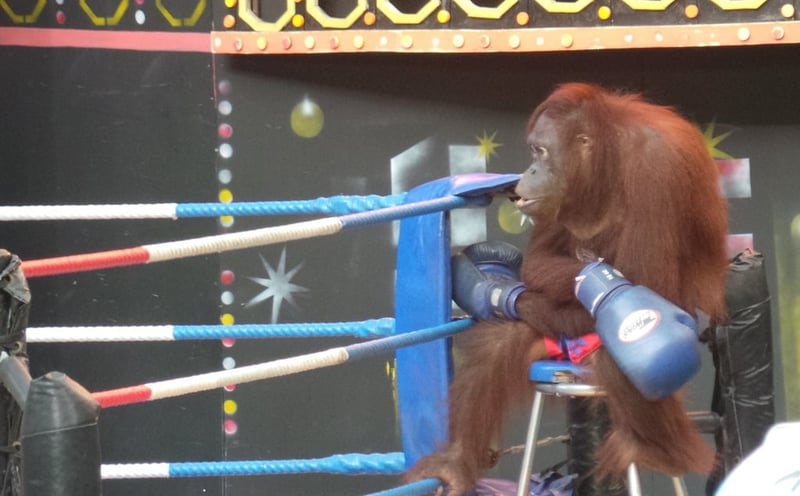
Witnessing wildlife cruelty at an orangutan show
News
A disturbing account from one of our investigators of an orangutan show at a major zoo in Southeast Asia.
The atmosphere was chaotic. For around 25 minutes – music blared from speakers, glitter cannons exploded, and the audience shrieked. In the middle of it all, a troupe of small orangutans ‘performed’ despite the deafening clamour.
From the moment they flew in on zipwires, the cruelty and trauma these animals were experiencing was evident. Orangutans in bras and miniskirts were pole-dancing and thrusting disturbingly. Doing sit-ups. Dancing. Stripping. The handlers constantly shoving, poking and grabbing the passive orangutans.
The featured boxing show was especially nasty to watch: these incredible animals were forced to hurt each other for no reason whatsoever. Throughout the ‘performance’ their faces registered utter dejection.
Cruelty behind the scenes
Perhaps the most disturbing thing about the show was its precision. These weren’t just orangutans capering around – the level of brutal conditioning necessary to fine-tune this kind of behaviour is unthinkable.
This is the root of the problem for animals exploited for entertainment: the worst of the cruelty takes place behind the scenes, long before the audience pay for the product. Every behaviour is deeply unnatural – every trick divorced from free will and natural instinct.
The audience don’t see the violence, the starvation, the torture necessary to produce these actions.
A scared baby
Throughout the show a baby orangutan, only about one-year-old, struggled to keep up and perform the right tricks. He looked so lost and scared – acting just like a human child might when they’re frightened.
His handler was rough with him, both during and after the show. But as the closest thing the little orangutan has to a parent, he clearly also trusted this person and looked to him for comfort, wrapping an arm around his legs whenever he was close enough.
In the wild, baby orangutans stay with their mothers for at least seven years, so seeing him so isolated and roughly handled was heartbreaking. This kind of early trauma can be enough to inflict permanent psychological damage.
Poor health
In general the orangutans were in poor condition, with hair patchy and thin. They all looked relatively young – not surprisingly, as the size and strength of a full-grown orangutan would be difficult to control. Serious questions need to be asked about what will happen to these orangutans once they get too big to be part of the show.
How you can help
Hundreds of people looked on happily – tourists, locals and schoolchildren – seemingly with no idea of the hidden cruelty involved.
That’s why it’s so important to educate tourists about animal shows – while the appetite exists, the cruelty will continue, and it simply has to stop.
Help to protect orangutans by reducing the demand for animals in entertainment in the countries where you holiday.